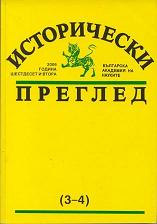Дуалистичните възгледи на П. Кисимов като деец на БТЦК (1866-1868)
P. Kissimov's Dualistic Conceptions as Political Figure of the Bulgarian Secret Central Committee (1866-1868)
Author(s): Georgi YakimovSubject(s): History
Published by: Институт за исторически изследвания - Българска академия на науките
Summary/Abstract: The article is a review of Kissimov’s political activities as an assessor of the idea of Bulgarian-Turkish dualism. He doesn’t take part in the establishment and the initial activity of the Bulgarian Secret Central Committee (BSCC). Kissimov makes an effort to enter the Secret Committee to work for the realization of his political ideas but as one who shares Pro-Russian orientation. The programme brochure “Bulgaria faces Europe” with which Kissimov takes part in the BSCC is analyzed in detail. This political document is regarded part of the Bulgarians’ efforts at the beginning of the 19th century to attract the attention of the European powers to the national problems. It’s adduced that with this article the Bulgarian émigré wants to the convince the Great Powers supporters of the status after 1856, that Bulgaria is ready for independent development and if his voice would not be heard, a bloody revolution would follow. Kissimov’s opinion that the first step for satisfying the National claims is that Bulgarians ought to get autonomous status within short time, within the Ottoman Empire. Attention is paid to the circumstance that in the document the Committee member did not escape from his successive Pro-Russian positions. In his attitude Kissimov continues the defined position from the 50ies for solving the national problem in a legal way within Turkey. The author makes a logical connection between Kissimov’s evolutionary manner and the current transformation of the Austro-Hungarian Empire into a dualistic state. This fact leads the members of the BSCC to the idea of possible dualism between the Bulgarians and the Porte. It is stated, that despite the fact that Kissimov is indicated in the historical researches as an author of the Memoir, the historical familiar document is a consequence of the efforts of the Committee Executive Board. The BSCC programme which is offered in the famous political act rejects the revolutionary methods of the struggle itself and looks for gradual innovations requiring patience and passivity in the expectations for the Sultan’s good will and the interference of the Great Powers. Such policy demonstrates unbelief in the Bulgarian forces. The article reveals the Kissimov’s opposition to rebel acts in 1867 and his definition as “permanent revolutionary catastrophes”. This chapter reviews the reasons for the conflict between P. Kissimov and Ivan Kassabov. This is the time when part of the Committee members show their respect and support to Hadji Dimitar’s unit. The analysis of Kissimov’s political steps in 1868 proves the statement that once again he appears to be an opponent of the revolutionary initiatives. This political line is proved by his appeal to Midhat Pasha after the self-sacrifice of the rebel. That is the way in which Kissimov looks for the realization of the idea for a dualistic state from the Memoir to the Sultan.
Journal: Исторически преглед
- Issue Year: 2002
- Issue No: 3-4
- Page Range: 93-135
- Page Count: 43
- Language: Bulgarian
- Content File-PDF

